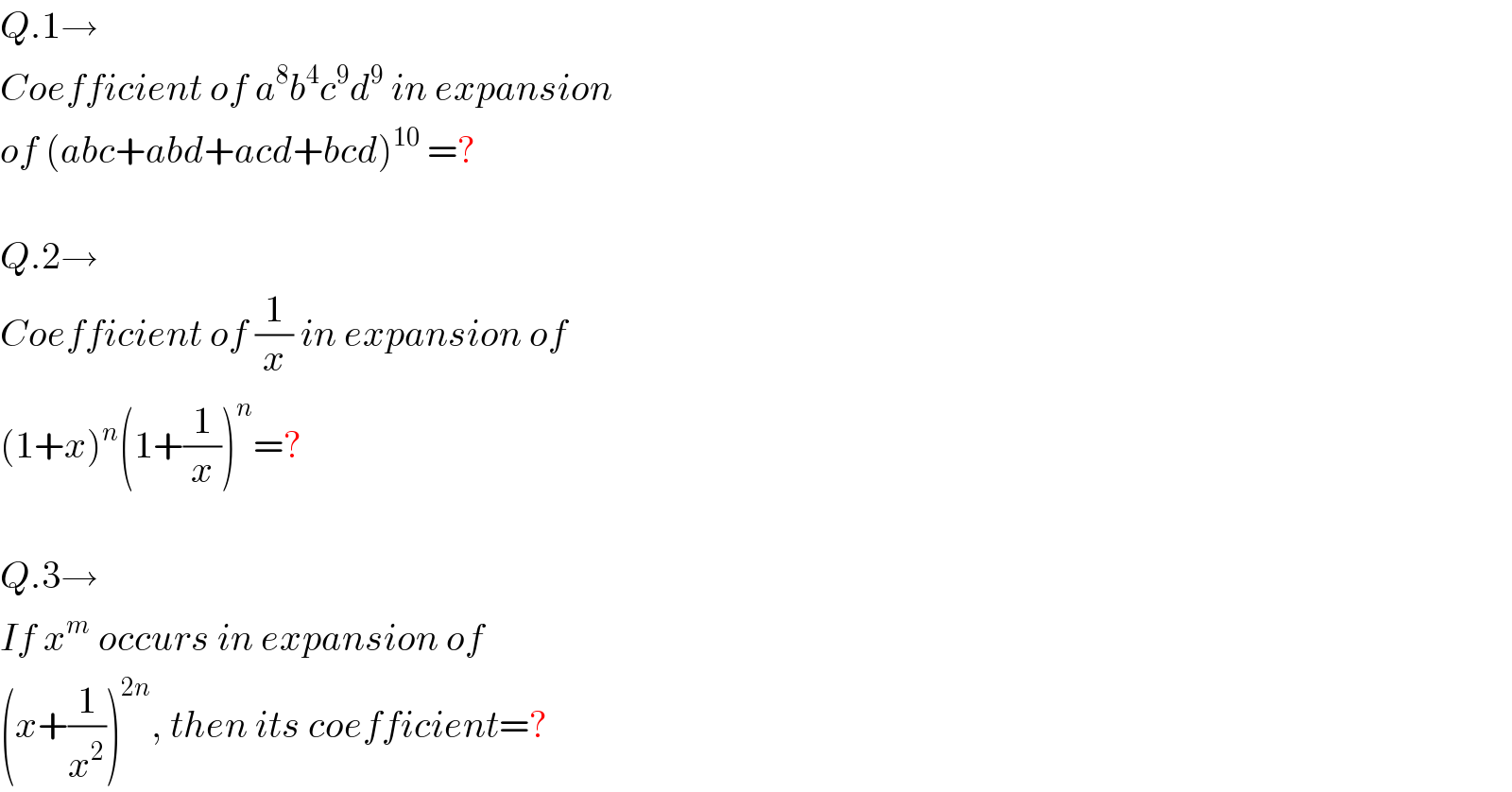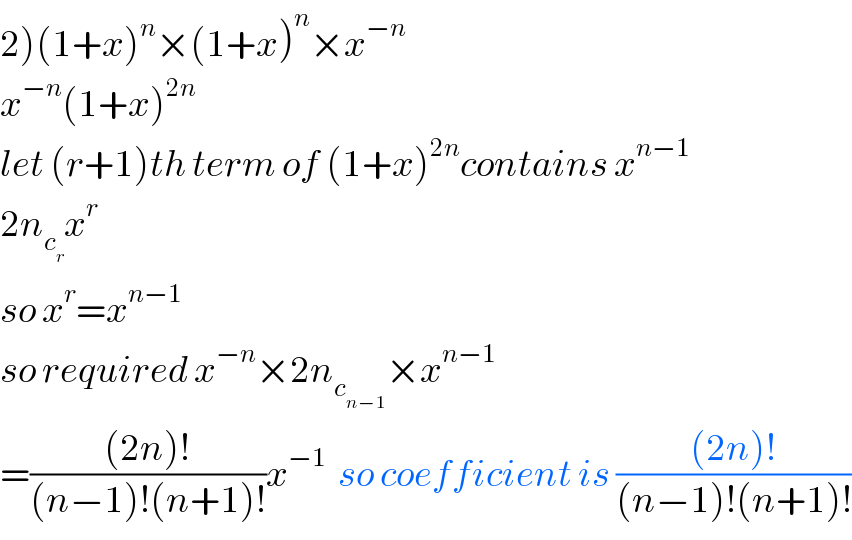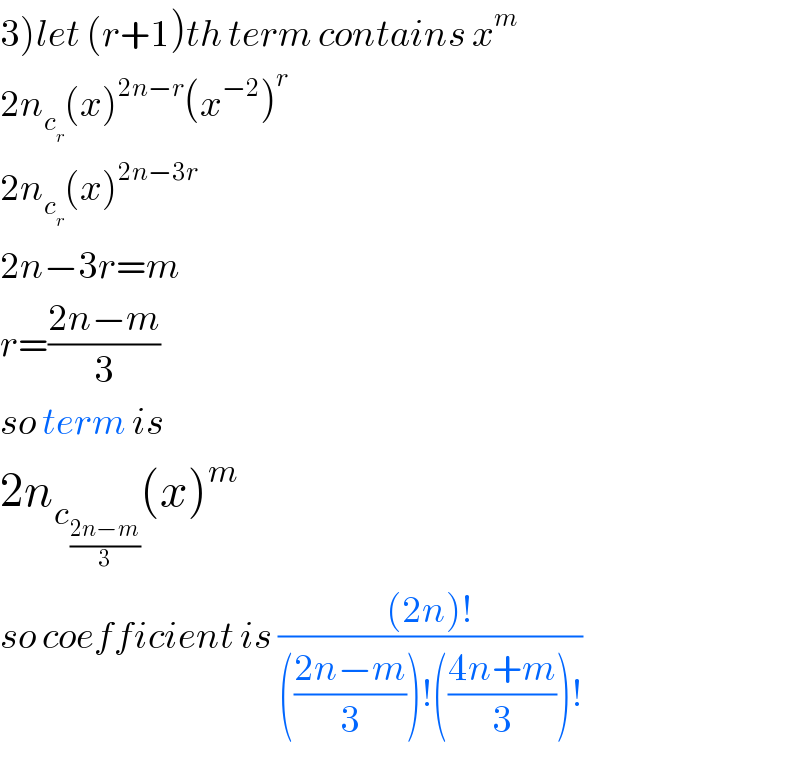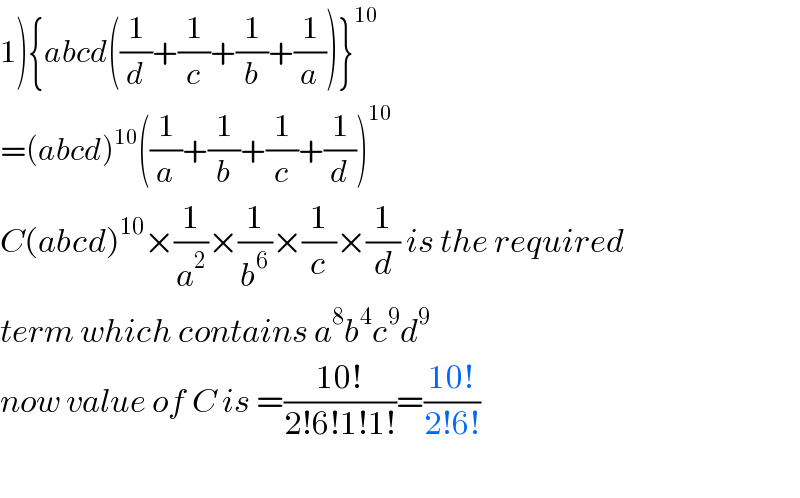
Question Number 48705 by rahul 19 last updated on 27/Nov/18

$${Q}.\mathrm{1}\rightarrow \\ $$$${Coefficient}\:{of}\:{a}^{\mathrm{8}} {b}^{\mathrm{4}} {c}^{\mathrm{9}} {d}^{\mathrm{9}} \:{in}\:{expansion} \\ $$$${of}\:\left({abc}+{abd}+{acd}+{bcd}\right)^{\mathrm{10}} \:=? \\ $$$$ \\ $$$${Q}.\mathrm{2}\rightarrow \\ $$$${Coefficient}\:{of}\:\frac{\mathrm{1}}{{x}}\:{in}\:{expansion}\:{of} \\ $$$$\left(\mathrm{1}+{x}\right)^{{n}} \left(\mathrm{1}+\frac{\mathrm{1}}{{x}}\right)^{{n}} =? \\ $$$$ \\ $$$${Q}.\mathrm{3}\rightarrow \\ $$$${If}\:{x}^{{m}} \:{occurs}\:{in}\:{expansion}\:{of}\: \\ $$$$\left({x}+\frac{\mathrm{1}}{{x}^{\mathrm{2}} }\right)^{\mathrm{2}{n}} ,\:{then}\:{its}\:{coefficient}=? \\ $$
Commented by rahul 19 last updated on 27/Nov/18

$${On}\:{request}\:{of}\:{Meritguide}\:{sir}, \\ $$$${these}\:{are}\:{some}\:{problems}\:.... \\ $$$$\left.{Hope}\:{u}\:{find}\:{them}\:{interesting}!:\right) \\ $$
Commented by maxmathsup by imad last updated on 27/Nov/18

$$\left.\mathrm{3}\right)\:{we}\:{have}\:\left({x}+\frac{\mathrm{1}}{{x}^{\mathrm{2}} }\right)^{\mathrm{2}{n}} ={x}^{\mathrm{2}{n}} \left(\mathrm{1}+\frac{\mathrm{1}}{{x}}\right)^{\mathrm{2}{n}} \:={x}^{\mathrm{2}{n}} \sum_{{k}=\mathrm{0}} ^{\mathrm{2}{n}} {C}_{\mathrm{2}{n}} ^{{k}} \:\:{x}^{−{k}} \:=\sum_{{k}=\mathrm{0}} ^{{n}} \:{C}_{\mathrm{2}{n}} ^{{k}} \:{x}^{\mathrm{2}{n}−{k}} \:{so}\:{the} \\ $$$${coefficient}\:{is}\:\lambda_{{m}} ={C}_{\mathrm{2}{n}} ^{{k}} \:\:/\mathrm{2}{n}−{k}\:={m}\:\Rightarrow{k}=\mathrm{2}{n}−{m}\:\Rightarrow\lambda_{{m}} ={C}_{\mathrm{2}{n}} ^{\mathrm{2}{n}−{m}} \:\:={C}_{\mathrm{2}{n}} ^{{m}} \\ $$$$=\frac{\left(\mathrm{2}{n}\right)!}{{m}!\left(\mathrm{2}{n}−{m}\right)!} \\ $$$$ \\ $$
Answered by tanmay.chaudhury50@gmail.com last updated on 27/Nov/18

$$\left.\mathrm{2}\right)\left(\mathrm{1}+{x}\right)^{{n}} ×\left(\mathrm{1}+{x}\right)^{{n}} ×{x}^{−{n}} \\ $$$${x}^{−{n}} \left(\mathrm{1}+{x}\right)^{\mathrm{2}{n}} \\ $$$${let}\:\left({r}+\mathrm{1}\right){th}\:{term}\:{of}\:\left(\mathrm{1}+{x}\right)^{\mathrm{2}{n}} {contains}\:{x}^{{n}−\mathrm{1}} \\ $$$$\mathrm{2}{n}_{{c}_{{r}} } {x}^{{r}} \\ $$$${so}\:{x}^{{r}} ={x}^{{n}−\mathrm{1}} \\ $$$${so}\:{required}\:{x}^{−{n}} ×\mathrm{2}{n}_{{c}_{{n}−\mathrm{1}} } ×{x}^{{n}−\mathrm{1}} \\ $$$$=\frac{\left(\mathrm{2}{n}\right)!}{\left({n}−\mathrm{1}\right)!\left({n}+\mathrm{1}\right)!}{x}^{−\mathrm{1}} \:\:{so}\:{coefficient}\:{is}\:\frac{\left(\mathrm{2}{n}\right)!}{\left({n}−\mathrm{1}\right)!\left({n}+\mathrm{1}\right)!} \\ $$
Answered by tanmay.chaudhury50@gmail.com last updated on 27/Nov/18

$$\left.\mathrm{3}\right){let}\:\left({r}+\mathrm{1}\right){th}\:{term}\:{contains}\:{x}^{{m}} \\ $$$$\mathrm{2}{n}_{{c}_{{r}} } \left({x}\right)^{\mathrm{2}{n}−{r}} \left({x}^{−\mathrm{2}} \right)^{{r}} \\ $$$$\mathrm{2}{n}_{{c}_{{r}} } \left({x}\right)^{\mathrm{2}{n}−\mathrm{3}{r}} \\ $$$$\mathrm{2}{n}−\mathrm{3}{r}={m} \\ $$$${r}=\frac{\mathrm{2}{n}−{m}}{\mathrm{3}} \\ $$$${so}\:{term}\:{is} \\ $$$$\mathrm{2}{n}_{{c}_{\frac{\mathrm{2}{n}−{m}}{\mathrm{3}}} } \left({x}\right)^{{m}} \\ $$$${so}\:{coefficient}\:{is}\:\frac{\left(\mathrm{2}{n}\right)!}{\left(\frac{\mathrm{2}{n}−{m}}{\mathrm{3}}\right)!\left(\frac{\mathrm{4}{n}+{m}}{\mathrm{3}}\right)!} \\ $$
Answered by tanmay.chaudhury50@gmail.com last updated on 28/Nov/18

$$\left.\mathrm{1}\right)\left\{{abcd}\left(\frac{\mathrm{1}}{{d}}+\frac{\mathrm{1}}{{c}}+\frac{\mathrm{1}}{{b}}+\frac{\mathrm{1}}{{a}}\right)\right\}^{\mathrm{10}} \\ $$$$=\left({abcd}\right)^{\mathrm{10}} \left(\frac{\mathrm{1}}{{a}}+\frac{\mathrm{1}}{{b}}+\frac{\mathrm{1}}{{c}}+\frac{\mathrm{1}}{{d}}\right)^{\mathrm{10}} \\ $$$${C}\left({abcd}\right)^{\mathrm{10}} ×\frac{\mathrm{1}}{{a}^{\mathrm{2}} }×\frac{\mathrm{1}}{{b}^{\mathrm{6}} }×\frac{\mathrm{1}}{{c}}×\frac{\mathrm{1}}{{d}}\:{is}\:{the}\:{required} \\ $$$${term}\:{which}\:{contains}\:{a}^{\mathrm{8}} {b}^{\mathrm{4}} {c}^{\mathrm{9}} {d}^{\mathrm{9}} \\ $$$${now}\:{value}\:{of}\:{C}\:{is}\:=\frac{\mathrm{10}!}{\mathrm{2}!\mathrm{6}!\mathrm{1}!\mathrm{1}!}=\frac{\mathrm{10}!}{\mathrm{2}!\mathrm{6}!}\: \\ $$$$ \\ $$
Commented by rahul 19 last updated on 28/Nov/18
thanks sir Ur all answers are absolutely correct!
Commented by tanmay.chaudhury50@gmail.com last updated on 28/Nov/18

$${thank}\:{you}\:{Rahul}...{how}\:{is}\:{your}\:{preparation} \\ $$$${for}\:{IIT}\:{JEE} \\ $$
